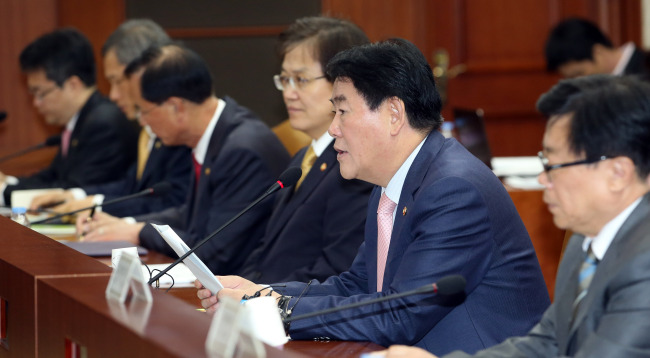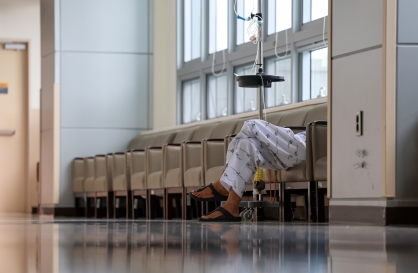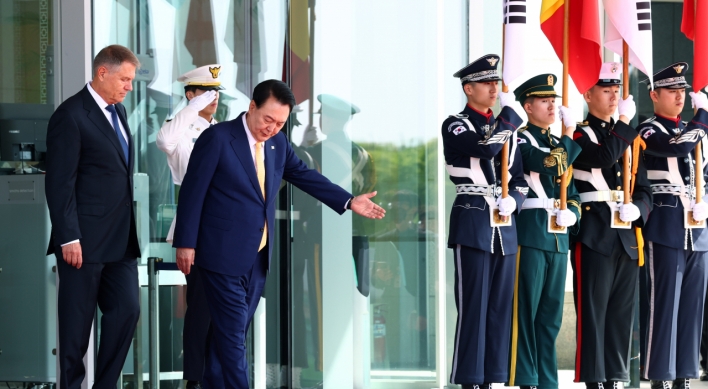Deputy Prime Minister and Finance Minister Choi Kyung-hwan is to be questioned during a parliamentary audit session on Thursday on whether his aggressive policies had the intended economic boosting effect.
Since he took office in July, Choi has reiterated that a bold fiscal stimulus of up to 41 trillion won ($38.5 billion) is needed to hoist the domestic economy out of its prolonged sluggishness.
But his vision, dubbed “Choinomics,” was also blamed for placing an excessive burden on the government budget and widening the gap between the nation’s rich and poor.
Since he took office in July, Choi has reiterated that a bold fiscal stimulus of up to 41 trillion won ($38.5 billion) is needed to hoist the domestic economy out of its prolonged sluggishness.
But his vision, dubbed “Choinomics,” was also blamed for placing an excessive burden on the government budget and widening the gap between the nation’s rich and poor.

The opposition political party, in particular, claims that the minister’s stimulus policies were designed to offer favors to society’s wealthier, and not the impoverished.
Choi will have to answer to these and other questions at the two-day audit.
“We will reveal the dangers and risks of Choinomics and suggest an alternative economic policy that would be more ideal for increasing incomes and cutting debt for domestic households,” said Rep. Woo Yoon-keun, floor leader of the main opposition New Politics Alliance for Democracy.
The opposition also blames Choiconomics for the latest faltering of local financial markets.
“Concerns on the government’s fiscal soundness are growing,” said the National Assembly Research Service in its recent report.
“The target budget (for next year) is too high, considering the limited financial resources, but there is also little room for the government to reduce spending.”
The ruling conservative Saenuri Party, where Choi formerly served as floor leader, is expected to back the minister and argue that his reflationary plans are needed to reactivate the economy.
A key point of dispute is the tobacco tax hike plan, which the public and the opposition camp see as a de facto tax hike. But the ministry insisted that the price change was for the sake of people’s health and a much-belated action, as the local tax system has remained stagnant since 1992.
Also, the plans for boosting stock dividends by imposing extra tax on uncooperative companies was largely criticized and called a means to reduce taxes for conglomerates and generate more wealth for business tycoons who hold stock by the bulk.
Choi’s measures for easing property market regulations are also expected to be a bone of contention, industry sources said.
The opposition party claims that the measures are encouraging excessive loans to aggravate the nation’s household debt problem.
According to the Bank of Korea, the total balance for household loans has been growing steadily since February and reached 717.2 trillion won as of end August.
By Bae Hyun-jung (tellme@heraldcorp.com)
-
Articles by Korea Herald




![[AtoZ into Korean mind] Humor in Korea: Navigating the line between what's funny and not](http://res.heraldm.com/phpwas/restmb_idxmake.php?idx=644&simg=/content/image/2024/04/22/20240422050642_0.jpg&u=)




![[Herald Interview] Why Toss invited hackers to penetrate its system](http://res.heraldm.com/phpwas/restmb_idxmake.php?idx=644&simg=/content/image/2024/04/22/20240422050569_0.jpg&u=20240422150649)

![[Graphic News] 77% of young Koreans still financially dependent](http://res.heraldm.com/phpwas/restmb_idxmake.php?idx=644&simg=/content/image/2024/04/22/20240422050762_0.gif&u=)




![[Exclusive] Korean military set to ban iPhones over 'security' concerns](http://res.heraldm.com/phpwas/restmb_idxmake.php?idx=652&simg=/content/image/2024/04/23/20240423050599_0.jpg&u=)


![[Herald Review] Xdinary Heroes kicks off five-month-long project with solo concert, teases new album](http://res.heraldm.com/phpwas/restmb_idxmake.php?idx=652&simg=/content/image/2024/04/22/20240422050539_0.jpg&u=20240422152154)
